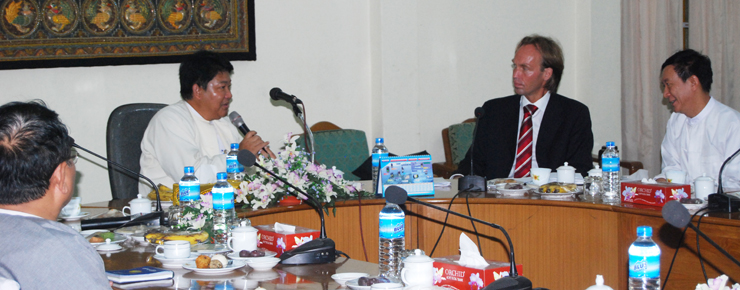Contribute to an eLearning Library in Myanmar
The Myanmar Government plan to establish eLearning systems in all universities. Modernization of teaching methods is one factor in reinventing an academic culture of high standard in Myanmar. However, the low band-width (low Internet speed) in universities hinders the creation of a Myanmar Education- and Research Network, and also important connections to international research- and education systems. Currently there are 15 medical and allied universities in Myanmar.
MY-NORTH has built the infrastructure for eLearning in one of them, University of Medicine 1 (UM1), Yangon. We are in the process of developing a library of eLearning lectures which can be accessed in a local intranet at UM1. After further development and investments in Myanmar the hope is that this library can be accessed by all health institutions. Meanwhile we will distribute eLearning lectures to all medical and allied universities to be used in local intranets.
Read more, please contribute with eLearning lectures or quizzes, internet resources, pbl.
Sub-projects
- Non-communicable diseases and associated factors in Myanmar
- Nutrition, Body Mass Index and risk factors of diabetes mellitus in Yangon region
News
-
MY-NORTH Norwegian medical students research Thesis Aug. 25, 2020
Cand Med Lise Larsen published a paper “Prevalence of Intimate Partner Violence and Association with Wealth in Myanmar”
-
MY-NORTH publish a second paper in the prestigious journal Nature June 4, 2020
The MY-NORTH research group has contributed with analyses of six population-based studies from Myanmar to the Nature publication “Repositioning of the global epicentre of non-optimal cholesterol”.
-
MY-NORTH PhD candidates June 1, 2020
Out of 7 PhD candidates under MY-NORTH, five have defended their dissertation.
About the MY-NORTH project
MY-NORTH has been developed over a long time, initiated through collaboration between Institute of Health and Society, UiO, and MOH/University of Public Health, Yangon, starting in 2009. The collaboration later expanded to University of Medicine 1, Yangon; Institutes of Basic Medical Sciences and Informatics at UiO; and Prince of Songkla University and Mahidol University in Thailand.
Myanmar is under rapid development towards democracy, and the government has made several new reforms in that direction. There are plans to pay more attention to education, including medical research training and research dissemination at university level. The project aims to improve capacity and quality in basic medical sciences and public health in Myanmar, through education, research, surveillance and dissemination of research findings.
By describing, analysing and evaluating the health and health care of people of Myanmar, the project will develop local evidence-based policy and practice which ultimately contribute to sustainable development and improved health among the population of Myanmar.
Objectives
- Strengthened capacity in public health- and basic medical training and research competence at Myanmar higher education institutions.
- Improved quality of information and data available in Myanmar that can be used for healthy public policies
Background
The medical curricula at graduate- and post graduate level in Myanmar are in need for modernisation. There is also a lack of population-based health data from Myanmar.
The country is affected by both non-communicable- and infectious diseases, and has health indicators at the lower end of the scale. According to Myanmar National Health Plan (2011-2016), “Development of Human resources for Health” and “Promoting Health Research” are important program areas that need to be emphasized, and according to Ministry of Education, “improvement of quality in education” is prioritized. Universities in Myanmar and The Ministry of Health express the importance of securing health services to the population, and re-establishing an academic culture, including research, international publications and curriculum improvement. In order to build well functioning health services, national health information systems are needed as well as training of health personnel and academics to make use of collected data to feed into national health plans and to inform local health workers. Thus, competence in research methodologies and a modern curriculum in public health and basic medicine will be important.
Financing
18 000 000 NOK from NORAD (the Norwegian Agency for development Cooperation)
Partner institutions
- University of Public Health, Yangon, Myanmar
- University of Medicine 1, Yangon, Myanmar
- Ministry of Health, Nay Pyi Taw, Myanmar
- Mahidol University, Bangkok, Thailand
- Prince of Songkla University, Songkla, Thailand
- University of Oslo:
- Institute of Health and Society, Faculty of Medicine;
- Department of Anatomy, Institute of Basic Medical Sciences, Faculty of Medicine;
- Department of Informatics, Faculty of Mathematics and Natural Sciences
Start and finish
2014 – 2018
